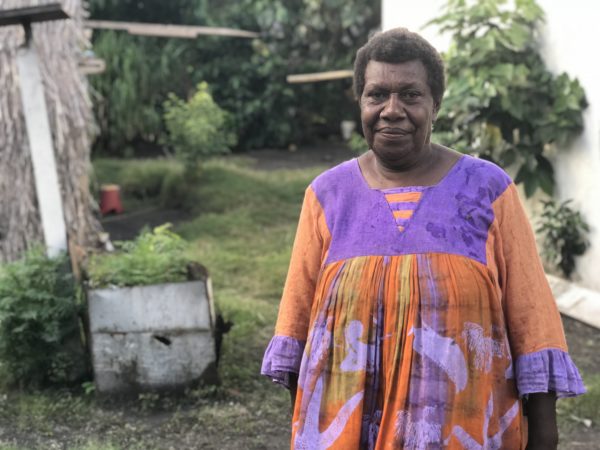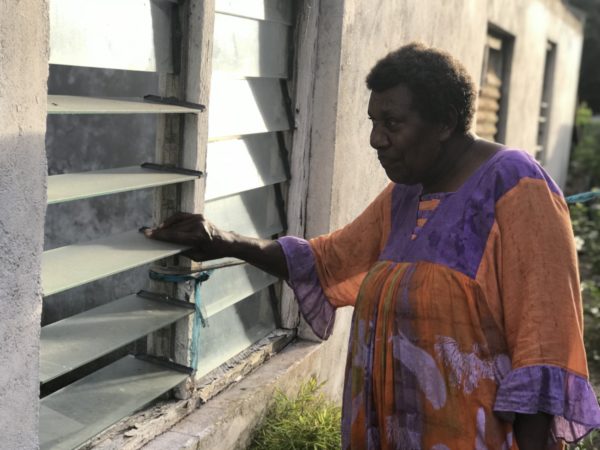Australia has one of the largest global mining footprints in the world with Australian companies currently operating many fossil fuel projects in low income countries.
Women are disproportionately affected not just at the point of fossil fuel extraction, but also by the impacts of climate change that are fuelled in large part by the burning of coal, oil and gas.
Extreme weather events such as drought, cyclones, and flooding are becoming both more frequent and severe due to climate change, leading to increased humanitarian emergencies.
Nowhere is this threat more real than in Vanuatu, a small Pacific Island nation who is no stranger to disasters.
Cyclone Pam devastated Vanuatu in 2015, ripping up trees and tearing off rooftops, turning the lush green islands brown and dry. A proud mother to five adult children, 62 year old Dorothy Pel lived through it all.

Dorothy Pel is a leader in the Women I Tok Tok Tugeta forum in Vanuatu
Dorothy lives on the island of Tanna, one of the southern island of Vanuatu’s archipelago. As is the case for many women on Tanna, one of the roles Dorothy plays is managing the home, cooking, and ensuring her family has enough to eat and drink.
After Cyclone Pam, we had a difficult time. There was hardly anything in the garden. It’s like Pam swept away everything, Dorothy explained.
In the aftermath of a disaster like this, women like Dorothy bear a huge responsibility for sourcing food, clean water and shelter for their families, even after everything has been blown away. This often increases their burden of unpaid care, as they may have to travel long distances to find the resources they need.

Dorothy looks through the windows of her old home, which was heavily damaged during Cyclone Pam
Many of the issues women faced in the aftermath of Cyclone Pam in Vanuatu were exacerbated by the gender inequalities they already face on a daily basis. Social and cultural norms discourage women from speaking out about issues they experience and taking leadership positions to ensure they get addressed.
Most women here on Tanna, they’re scared to talk out because they’re thinking that they’re nobody. Men look down on them and they’re scared to come out, said Dorothy.
Rates of gender-based violence in Vanuatu are already amongst the highest in the world, but they climb even higher in the aftermath of an emergency.
Women’s rights after Cyclone Pam are being addressed by the ‘Women I Tok Tok Tugeta’ forums supported by ActionAid Australia , of which Dorothy is a leader.
Through ‘Women I Tok Tok Tugeta’, women across Tanna and neighbouring islands Eton and Erromango, are being supported to lead in building the resilience of their communities to prepare for any future disasters.

The Women I Tok Tok Tugeta forum on Tanna Island, Vanuatu
The Women I Tok Tok Tugeta forum on Tanna Island, Vanuatu
Dorothy’s group has mapped out clear steps for how they are going to make power-holders aware of the issues women are facing.
Vanuatu is consistently ranked as the country most at risk of disasters [1], and it is women who are on the frontlines of these crises.
ActionAid Australia is committed to fighting for a world where women are resilient in the face of increasing crises and disaster, leading preparedness, response and recovery efforts to secure their rights. Part of this work is to go straight to the root of the problem – and this means taking strong action to reduce carbon pollution from fossil fuels.
That’s why we’re calling on the Government to stop funding fossil fuel projects, and ensure Australian companies uphold women’s rights wherever they operate.
ActionAid Australia’s latest report, Undermining Women’s Rights: Australia’s global fossil fuel footprint, shines a light on the impacts of coal, oil and gas extraction on women in low income countries.
Sources
[1] http://weltrisikobericht.de/wp-content/uploads/2017/11/WRR_2017_E2.pdf